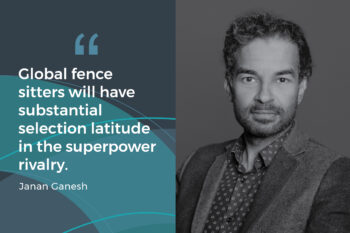This article was first published in Hedgeweek on 1st September 2023 here.
Few hedge fund professionals have held leadership roles in the US, UK, and France. Benjamin Roy’s career has seen him lead tech teams on both sides of the Atlantic, including as head of global markets technology and operations of Americas at Société Générale, and now as Chief Technology Officer (CTO) at Paris-headquartered quantitative investment manager Capital Fund Management (CFM), where he is overseeing the evolution of the firm’s technological platform and IT teams.
Ahead of next week’s European Hedge Fund Leadership Summit, Hedgeweek spoke with Roy about his new role at CFM – which he joined in October 2022 – the wider challenges facing hedge fund technologists, advances in artificial intelligence, and his approach to leadership.
Hedgeweek (HW): Hi, Benjamin – thank you for joining us today.
Benjamin Roy (BR): Hi, Tony.
HW: Do you go by Benjamin or Ben?
BR: Ben, usually.
HW: In which case welcome, Ben. It’s been 10 months since you started your role as CFM’s CTO. What have your priorities been during this initial period?
BR: When I started, my first task was to understand CFM. CFM is a great machine, and it was important for me to understand the business and to appreciate the culture of the company. After that, I had two priorities: firstly, create a strong bond and partnership with the research teams. Secondly, assess the firm’s technical information system and technology practices, and, from there, define a roadmap to growth and accelerate technology transformations.
HW: In terms of your progress – to what extent have the wider economic challenges facing all businesses affected your ability to innovate and make headway with those priorities?
BR: We embarked on this transformation about five months ago now and, if anything, we’ve been able to accelerate that progress and leverage new capabilities for CFM, especially around alternative data and cloud transformation.
HW: We’ll return to alternative data, as I know it’s an important topic for you. But first, you’ll be joining us in London for the Leadership summit next week, speaking on a panel about broader data challenges. Could you give us a flavour of what you’ll be discussing?
BR: Sure. Fortifying our data analysis capabilities is a core focus for us, and one of the biggest challenges here is being able to qualify new datasets quickly and efficiently. We have established testing protocols, procedures, and technology to help us do this, but in a space where we are growing and the number of datasets we consume is growing, this is a particularly important challenge to meet.
Turning back to alternative data – how has it added value for CFM and its clients during 2023?
Alternative data has been an important source of alpha for us this year, helping our portfolio managers anticipate economic movements and recast our market exposure during a challenging period. So, yes, alternative datasets have been a great source of value for us and our clients – and will continue to be as we keep improving our ability to process bigger, more complex datasets.
HW: To what extent have you been using AI and machine learning to manage these alternative datasets?
BR: We’ve been using these tools as a logical evolution of our previous generation of tool sets. For quant firms – and specifically the latest evolution of AI like ChatGPT and the other natural language models – these tools have delivered interesting capabilities that we are currently testing. And, yes, they are helping us process and find insights in alternative and big datasets.
Roy joined CFM just one month before ChatGPT was released to the wider public by OpenAI in November 2022. The AI-powered language model has been credited with changing the way investors and the media think about and discuss AI, creating challenges and opportunities alike for investment managers. But industry observers have also suggested that the hype around ChatGPT has overshadowed the years of progress on AI/machine learning innovations made by many tech-savvy investment managers. A Hedgeweek survey conducted in February 2023 found that 40% of hedge fund firms were using AI to improve their investment returns (and 14% were already using ChatGPT to improve their business). The latest Hedgeweek survey to cover the topic of AI – conducted throughout August 2023 – found a similar proportion of hedge fund managers using AI (38%), including 15% using it for autonomous trading and 27% using it to assist the research process.
HW: AI has been a hugely important topic in investment management for many years, but arguably it’s only recently that the topic has become mainstream. Has this recent shift had a meaningful influence on the way you, as a tech-focused investment manager, compete with peers and/or engage with investors?
BR: I think what ChatGPT shows is that the pace of innovation is accelerating. The number of new models, open source in particular, and tools to manage those models in the investment process are growing exponentially.
But while it is a bit easier to use those models and tools than perhaps it was, at the same time, it is very important to spend time using and testing them in our context with our data. It might seem easy on paper but testing them in our investment process is not. We’ve been doing that for years and we have a scientific culture to assess whether the results are good or just noise. It’s relatively easy to do a proof of concept with a new open-source model, but it’s a lot more difficult – for now – to be able to use them in production on a daily basis.
Also – and this fits very well with CFM – we’re seeing less of a clear distinction between engineering, technology, and research. Our experience shows that, to exploit new sources of alpha with those models and tools, data engineers need to work very closely with researchers and to have a research mindset.
HW: Is CFM finding that conversations with investors concerning AI – or disruptive technologies more broadly – are easier now that the concept of AI has more exposure?
BR: In one sense, yes, those conversations are a bit easier because everybody now has a basic understanding of what AI is. That being said, it’s still a complex set of technologies and being able to have a conversation at that level takes time. Once the beginning of the conversation is made easier – and everybody starts with the same questions now: how are you using it? What are you using it for? – you then go to the next level, explaining the complexity around creating value and embedding it safely into an investment process.
Speaking to Hedgeweek back in May 2022, CFM Chief Product Officer Laurent Laloux said newly emerging tech stacks, alternative data, and cloud capabilities were influencing hedge funds’ hiring processes. CFM was hiring “a lot of data scientists”, he noted, adding that the emergence of data science is bringing a newer and younger profile of recruit, “people already well-trained in managing data and extracting features from data.” Roy, who as CTO reports into Laloux, echoes these sentiments during our conversation.
HW: To what extent has the hype around AI affected recruitment? Have you noticed any patterns or changes in the skillsets and expectations of the candidate you’re speaking with for tech roles?
BR: The AI and machine learning space is growing and we’re growing those capabilities as well so we’re recruiting more and more. We see – and we want to see – more candidates with those skillsets and experiences. In addition, we’ve noticed that, for some of the technical tests we do for recruitment, we can use a ChatGPT-style tool to complete the tests. And so, we are adapting our technical tests and to make sure that candidates are not using ChatGPT, or something similar, to get ahead.
HW: That’s interesting – how else has it affected the way you assess these tests?
BR: Well, when we test candidates, they have a short timeframe, and we record them and then discuss. It’s pretty easy during a discussion to spot if a candidate has done the test themselves or if they used tools. The change, then, is how we start the discussion after the test. Ultimately, all of this shows that you cannot only rely on technical tools to assess candidates; you need to have discussions, which we have had in the past, but now really need to dive into the more complex technical questions to see the thought process of the candidate.
HW: As the title of our upcoming summit suggests, we’re also interested in leadership. How would you describe your approach to leading a team and how its evolved in recent years?
BR: I believe we’re stronger when working together towards a common goal. So, for me, my approach as a leader has been to foster a collaborative environment where there is open communication and where we can leverage the collective expertise to achieve great outcomes. That’s one key aspect of the way I’m working. I’m also strongly convinced that, for CFM to flourish, we need, on the one hand, to stay at the forefront of technological advancements and continue to transform our information system. On the other hand, we need to maintain a robust, stable, and secure infrastructure. A leader needs to balance those two things on a daily basis – company transformation and company robustness.
HW: Your career has seen you working in London and Paris. From the perspective of your work and experiences, how would you describe the relative strengths of these two European hubs?
BR: London has a big tech talent pool for the hedge fund industry and capital markets. When an investment firm wants to tap into that, they can create value very quickly.
So, yes, London is still the main hub in Europe – and your European leadership summit is going to be a great opportunity for me to nurture my network – but Paris is also a great place to build strong tech and research teams.
Paris has a good pool of tech engineers with a strong scientific background; people that are curious, eager to learn, and eager to learn outside of their core competency. I think that kind of curiosity is present in all the top tech engineers, and I think that’s something hedge fund firms have discovered in the past few years, because we’ve seen a lot of hedge funds and capital markets positions opening in Paris, with an uptick in senior roles. Slowly but surely Paris’s hedge fund industry is becoming bigger than it is today. I don’t know if this has impacted recruitment activity in London yet, but I can say that the talent pool in Paris is growing, and competition is growing as well.
HW: Thank you, Ben. And finally, we want to know how hedge fund leaders start their day! What does your morning look like during a typical working week?
BR: Well, I don’t have just one routine! But usually when I wake up, I start by looking at my emails to see if there’s anything important that I need to pick up immediately or add to my to-do list. I take care of my children before they go to school, then ride my bicycle to the office, dropping my son at school on the way.
When I get to the office, I usually do three things: first, I check in with my direct reports to see how things are going. Second, I scan the tech and financial news to stay informed and check for articles I need to read to stay informed and keep up with the latest developments that could impact CFM.
And third, I review my agenda for the day. One of the things I think makes a successful leader is the ability to balance strategic topics and short-term topics. It’s a must on a weekly basis. But for me, it should also be done daily. I’m not only focused on the short term or only on strategic – finding the right balance is important.
Benjamin Roy is among the many hedge fund leaders speaking at Hedgeweek’s European Leadership Summit in London on 7 September. The event is primarily for senior operations and technology professionals at established hedge fund management firms.



